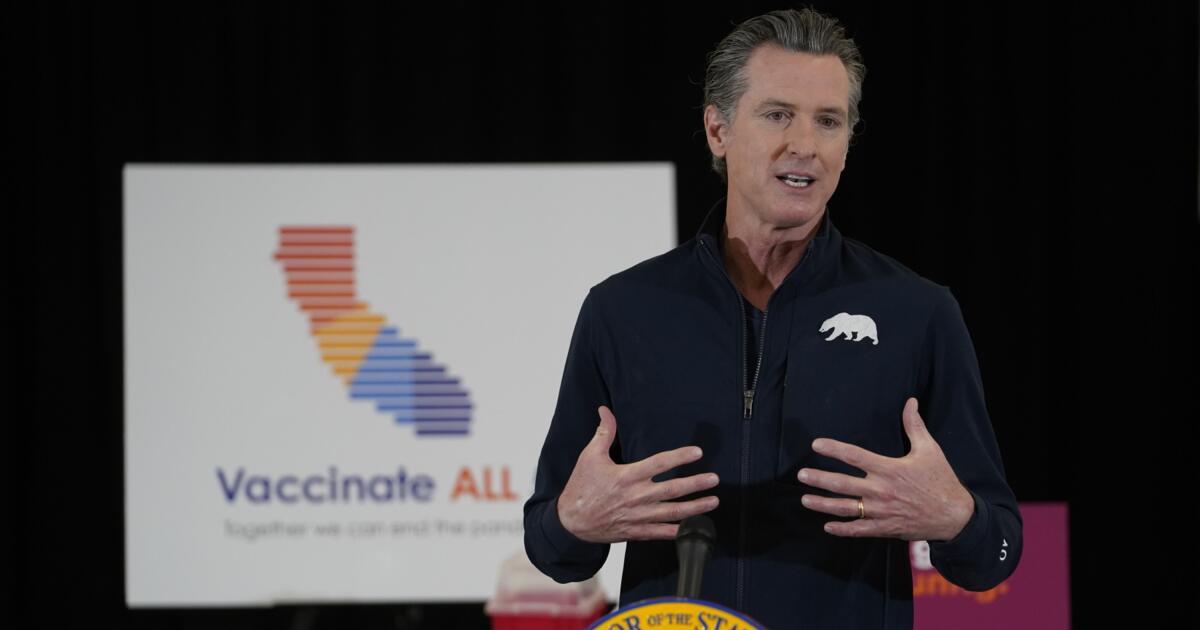SACRAMENTO — With the U.S. Centers for Disease Control and Prevention in turmoil and vaccine skeptics gaining influence in the Trump administration, California is working with Washington and Oregon to forge a pact that will offer its own public health guidelines.
The government's Gavin Newsom of California, Tina Kotek of Oregon and Bob Ferguson of Washington announced Wednesday the creation of the West Coast Health Alliance, which they said will provide science-based advice as the nation's top public health agency reverses longstanding vaccine recommendations.
Robert F. Kennedy Jr., secretary of the U.S. Department of Health and Human Services and a staunch Trump ally, fired top scientific advisers and fired top leadership at the Centers for Disease Control and Prevention (CDC), shaking public confidence in the agency. And Kennedy warned that turnover could increase.
“President Trump’s mass firing of CDC doctors and scientists and his blatant politicization of the agency are a direct attack on the health and safety of the American people,” the three governors said in a joint statement Wednesday. “The CDC has become a political tool that increasingly promotes ideology instead of science, an ideology that will lead to serious health consequences.”
The rebuke from West Coast states highlights growing concerns about the life-saving consequences of the Trump administration's health care policies. For decades, the CDC has been the nation's authority on vaccines, setting immunization schedules for children, determining which vaccines adults should receive and shaping public health policy across the country.
The states said their health care alliance will focus on providing science-based recommendations about who should receive immunizations while ensuring the public has access to reliable information about the safety and effectiveness of vaccines.
This isn't the first time the three states have banded together to confront turmoil at the federal public health agency. In June, states condemned Kennedy's decision to remove all 17 members of the CDC's Advisory Committee on Immunization Practices. Among the replacements named by Kennedy are appointees who spread misinformation about vaccines and spread conspiracy theories during the COVID-19 pandemic, reports the Associated Press.
Kennedy said the change would improve public confidence by ensuring committee members do not have “any particular pro- or anti-vaccine agenda.”
Polls show the opposite effect. A Kaiser Family Foundation poll last month found that Americans across the political spectrum are increasingly unsure about public health guidelines and whether the administration's new recommendations will make them more or less safe.
Experts say vaccines are not only critical to the health of individuals and communities, but they also ultimately save money by preventing illness and rising health care costs that can accompany large-scale disease outbreaks.
Andrew Nixon, director of public affairs for Health and Human Services, told The Times that it was actually California and Washington that undermined trust in public health with their response to the coronavirus pandemic, and he opposed efforts to create a shadow CDC.
“Democrat-run states that have imposed unscientific restrictions on school quarantines, mask mandates for children, and draconian COVID-era vaccine passports have completely undermined the American people's trust in public health agencies,” he said.
Nixon said the CDC's vaccine advisory committee “remains the scientific body guiding immunization recommendations in this country, and HHS will ensure that policy is based on rigorous evidence and the gold standard of science, not on failed pandemic policies.”
Controversy begins over vaccine guidelines as a new wave of COVID gains momentum and flu season is approaching. In California, some county-level health officials are recommending that residents take stricter precautions, such as temporarily wearing masks in indoor public spaces. As of last week, the Centers for Disease Control and Prevention (CDC) estimates the number of COVID cases growing or likely growing in 30 states and the District of Columbia.
The increase comes as federal guidance makes it more difficult to get the COVID vaccine. The Food and Drug Administration, which Kennedy administers, now requires adults 65 and younger and otherwise healthy — who say they have no underlying health problems — to consult with a health care provider before getting a shot. Likewise, the CDC requires parents of healthy children to speak with a health care provider before their child can receive a COVID vaccine, and the American Academy of Pediatrics called this barrier “deeply troubling.”
The American Academy of Pediatrics has issued its own COVID vaccination guidelines, contrary to CDC recommendations, which say all young children ages 6 to 23 months should be vaccinated, as well as some high-risk older children. The group also said older children should be offered the vaccine if their parents request it.
Earlier this year, the CDC changed its vaccination schedule from recommending the COVID vaccine to all pregnant women to “no guidance” on whether healthy pregnant women should be vaccinated. In response, the American College of Obstetricians and Gynecologists recommended that people receive an updated COVID-19 vaccine at any stage of pregnancy.
This is not the first time California has created a state guarantee to test federal vaccine recommendations. In 2020, Newsom created a group of doctors and scientists working at the California Department of Public Health to Conduct an independent review of all newly created COVID vaccines approved by the FDA.which were developed during President Trump's first term. At the time, there were concerns that the White House would rush to approve the initiative, called Operation Warp Speed.
Three other states – Washington, Oregon and Nevada – quickly joined A California initiative that was renamed the Western States Scientific Safety Review Working Group and reviewed subsequent versions of COVID vaccines. The review panel came back and said the vaccines were safe and effective.
Now, amid growing turmoil at the Centers for Disease Control and Prevention (CDC), California is reviving that scenario, saying the public needs reliable information about the safety and effectiveness of the vaccines. The three-state effort followed more than 1,000 current and former U.S. Health and Human Services officials calling on Kennedy to resign.
Kennedy is expected to face bipartisan criticism from Senate Finance Committee Thursday morningwhere he was already scheduled to testify on the president's health care agenda for the coming year. Sen. Bill Cassidy, a Louisiana Republican and member of the committee, vowed to “watch” Kennedy and the agency after raising concerns about his skeptical approach to vaccine policy.
Peter Chin-Hong, an infectious disease expert at the University of California, San Francisco, said that while California's health care alliance with Oregon and Washington is largely symbolic for now — providing an alternative voice to the Centers for Disease Control and Prevention (CDC) — it risks increasing health care polarization. It is critical, he said, that health professionals from across the political spectrum come together.
Chin-Hong said other state alliances are forming, including eight states in the Northeast and a group of health systems in the upper Midwest.
“What you're seeing is people advocating for science coming together and bringing people together to give a counter-argument to what the CDC is saying,” Chin-Hong said.
But things can get more complicated when it comes to funding vaccination programs. He said insurance companies generally follow CDC guidelines. If the federal government does not recommend vaccines, it is unclear how they will be covered.
However, Chin-Hong noted issues of political division and community resistance around immunization, pointing to Florida's announcement that vaccinations will no longer be required in public schools.
“This is all such nonsense,” he said. “It’s like today is ‘opposite day’ and we’re all in some kind of Dr. Seuss story where nothing is what it seems.”
Jake Scott, an infectious disease doctor and clinical assistant professor at Stanford Medical School, said the alliance could put the three states at risk of retaliation from Trump and his allies.
“We've already seen this administration use federal agencies to go after states that don't comply,” Scott said. “These states are most likely considering cuts in federal funding, regulatory prosecution, etc. But honestly, what is the alternative? The cost of simply spreading preventable diseases, completely losing public confidence in vaccines, throwing away decades of medical data – it would be catastrophic. From a medical perspective, these states really have no choice, regardless of the political consequences.”
Times staff writer Rong-Gong Lin contributed to this report.







